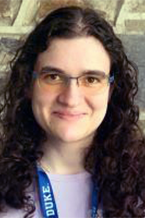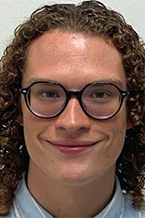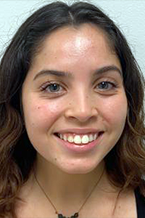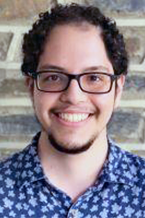
Graduate students at Duke University School of Medicine have been honored by the National Science Foundation Graduate Research Fellowship Program (GRFP).
Alev M. Brigande and Daniel Quintero in the Duke Department of Neurobiology, along with Violet Beaty, Porter Krev Ellis, and Celeste Marin in the Duke Department of Biochemistry received fellowships, joining biochemistry student Dalal Azzam who earned the honor in 2022.
The five-year fellowship recognizes outstanding graduate students with potential to be high-achieving scientists and engineers and provides three years of financial support for their early career pursuits in science, technology, engineering, and medicine (STEM).
“Recognition from the National Science Foundation speaks volumes about their dedication, intellect, and potential to shape the future of scientific discovery,” said Richard Brennan, PhD, chair of biochemistry at Duke School of Medicine.
“Their achievements not only reflect the brilliance of Duke’s graduate students in biomedical research but also the University’s commitment to fostering excellence in STEM education and research,” Brennan said. “We are immensely proud of their accomplishments and look forward to witnessing the impact of their groundbreaking work in the years to come. Duke is an excellent place for young scientists to pursue their career goals.”
Past GRFP fellowship recipients have made significant contributions to research, teaching, and discovery, emerging as leaders in their academic and professional careers.
Past recipients have made significant contributions to research, teaching, and discovery, emerging as leaders in their academic and professional careers.
“The fellowship program represents a critical investment in the next generation of scientists,” said Stephen Lisberger, PhD, chair of neurobiology at Duke School of Medicine. “By supporting these talented students, the program fosters excellence and innovation and ensures a vibrant scientific workforce.”
Fellowship recipients and their research:

Dalal Azzam, a second-year graduate student in the laboratory of Lorena Beese, PhD, is combining biochemistry and structural biology to understand how proteins and DNA interact. The approach gives a multi-dimensional look into the science at the core of all life. Azzam seeks to uncover how faults in these interactions can lead to significant problems in biological processes downstream.

Alev Brigande a graduate student in the lab of Anita Disney, PhD, is researching how neuromodulators like dopamine and serotonin dynamically affect brain function and behavior. While these neuromodulators are typically studied individually or in pairs, at least five of them simultaneously influence neural activity and behavior within the cortex. Brigande is investigating how the cortex integrates inputs from multiple neuromodulatory systems.

Violet Beaty, a second-year graduate student in the laboratory of Shuo Han, PhD, studies the connection between gut health and aging. The human microbiota contains diverse bacterial phyla, encompassing remarkable genetic and metabolic diversity. As the gut microbiota influences age-related changes in its host organisms, Beatty investigates which gut bacterial species and metabolic pathways play a role in longevity and promote healthy aging.

Porter Ellis, a second-year graduate student in the laboratory of Maria Schumacher, PhD, studies proteins called nucleoid-associated proteins (NAP). Emerging evidence highlights the importance of NAPs in fundamental biological processes, including gene regulation, virulence, and stress responses. Ellis’ work is positioned to advance understanding of the mechanisms by which many NAPs interact with DNA and function in regulatory processes.

Celeste Marin, a second-year graduate student in the laboratory of Christopher Nicchitta, PhD, focuses on how cells respond to stress by investigating changes in DNA transcription and RNA modification. Marin plans to use optical imaging techniques to observe RNA trafficking dynamics during stress to further our understanding of these regulatory processes that are critical for cell survival.

Daniel Quintero, a graduate student in the laboratory of Cagla Eroglu, PhD, investigates the role of astrocytes, star-shaped glial cells found in the central nervous system. The Eroglu lab focuses on studying how astrocytes contribute to synaptogenesis, synapse maintenance, and overall brain health and disease. Quintero is actively researching to identify the cellular and molecular mechanisms by which astrocytes influence sleep.